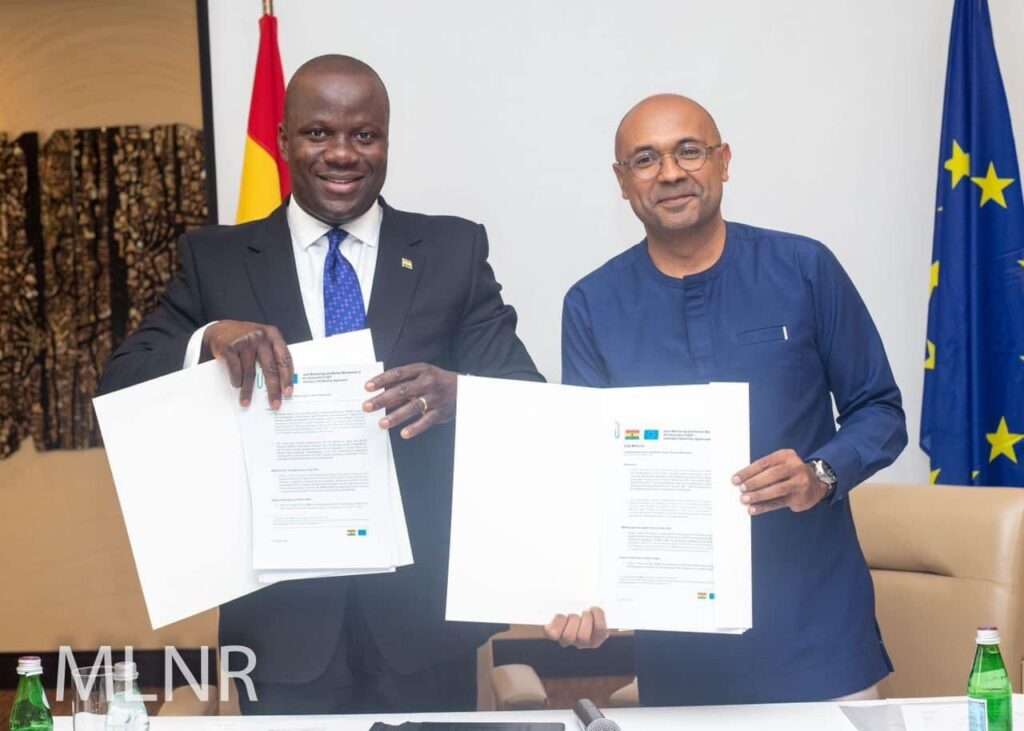Ghana has taken a major step in sustainable forestry management, becoming the first African nation to secure a Forest Law Enforcement, Governance and Trade (FLEGT) licensing agreement.
This historic agreement with the European Union (EU), signed at the 12th session of the Ghana-EU Joint Monitoring Review Mechanism of the Voluntary Partnership Agreement (VPA) in Accra, is set to commence on June 30, 2025. This milestone positions Ghana as a trailblazer in Africa for legally verified timber products, enhancing both economic potential and environmental stewardship.
Hon. Samuel A. Jinapor, Ghana’s Minister for Lands and Natural Resources, praised the exhaustive stakeholder consultations and dedicated efforts that led to this achievement. The agreement reflects over a decade of negotiations, capacity building, and policy reforms aimed at improving the forest sector’s governance, thereby establishing an exemplary system of legality verification.
“This achievement is the result of collaborative dialogue and strategic deliberations focused on ensuring transparency, accountability, and the sustainable management of our forest resources.
“The Aide Memoire we are signing today provides a comprehensive roadmap that solidifies our commitment to responsible forest management and economic growth through legal timber trade.”
Hon. Samuel A. Jinapor, Minister for Lands and Natural Resources
The FLEGT licensing system is a key component of Ghana’s strategy to curtail illegal logging and increase economic opportunities through regulated timber exports.
The signing of the Aide Memoire marks the resolution of identified technical and policy issues, establishing a strong foundation for Ghana’s FLEGT-compliant trade.
According to Hon. Jinapor, this model is expected to inspire other countries on the continent that wish to pursue similar paths toward sustainable and legal forestry.
“We celebrate this milestone as a result of the commitment of our stakeholders, including the support from the United Kingdom and the EU,” Hon. Jinapor added.
He acknowledged the instrumental role of the UK, which, prior to Brexit, provided substantial grant funding and technical support to develop Ghana’s legal and technical frameworks for FLEGT compliance.
Future Prospects and the Role of Regional Partnerships

With Ghana set to begin FLEGT licensing by mid-2025, attention now turns to the nation’s implementation efforts and regional partnerships that can build upon this success.
As Ghana continues to establish itself as a leader in legal timber trade, it is anticipated that other African nations may look to replicate this approach. The EU’s continued support, coupled with knowledge-sharing platforms, will be critical in fostering similar initiatives across the region.
“This achievement is a testament to our commitment to building a sustainable forest sector.
“With the support of our international partners, we are confident in our ability to implement this licensing system effectively and, in doing so, serve as a model for sustainable forestry governance across the African continent.”
Hon. Samuel A. Jinapor, Minister for Lands and Natural Resources
The EU Ambassador to Ghana, H.E. Irchad Razaaly, also commended Ghana’s efforts. He noted that this achievement culminates a 15-year journey, driven by Ghana’s steadfast dedication to meeting the stringent standards set by the FLEGT licensing system.
Ambassador Razaaly highlighted that Ghana’s success sends a positive message to the global market, enhancing the country’s reputation as a reliable and legally compliant timber source.
“Ghana has shown commitment in implementing a system that assures international markets of the legality of its timber products.
“This credibility will not only bolster Ghana’s position in the global timber market but will also attract investors interested in ethical sourcing and sustainable practices.”
H.E. Irchad Razaaly, EU Ambassador to Ghana
Ambassador Razaaly noted that the FLEGT system serves as a regulatory mechanism that upholds Ghana’s forestry standards, demonstrating to global partners that Ghana is serious about implementing sustainable forestry practices.
With Ghana set to begin FLEGT licensing by mid-2025, attention now turns to the nation’s implementation efforts and regional partnerships that can build upon this success.
As Ghana prepares for the full rollout of the FLEGT licensing system in 2025, the country’s ambition to balance environmental protection with economic growth sets a precedent for sustainable development, making it a noteworthy leader in Africa’s environmental governance.
READ ALSO: Abeiku Santana Reacts to Donald Trump’s Win



















